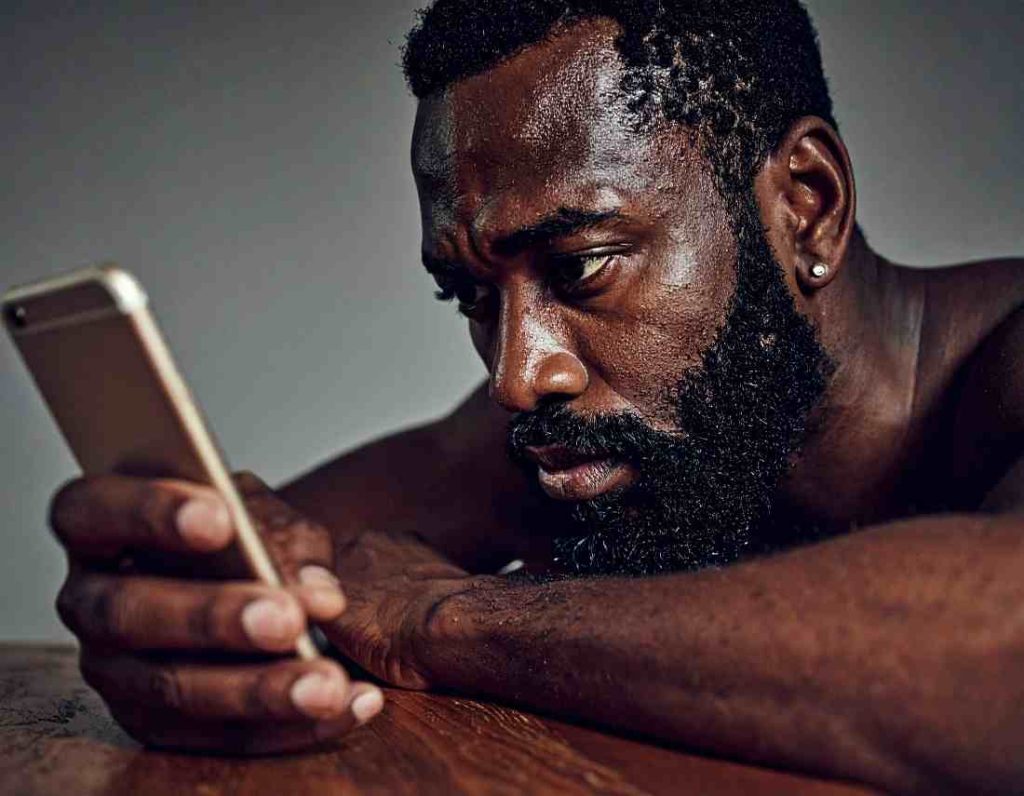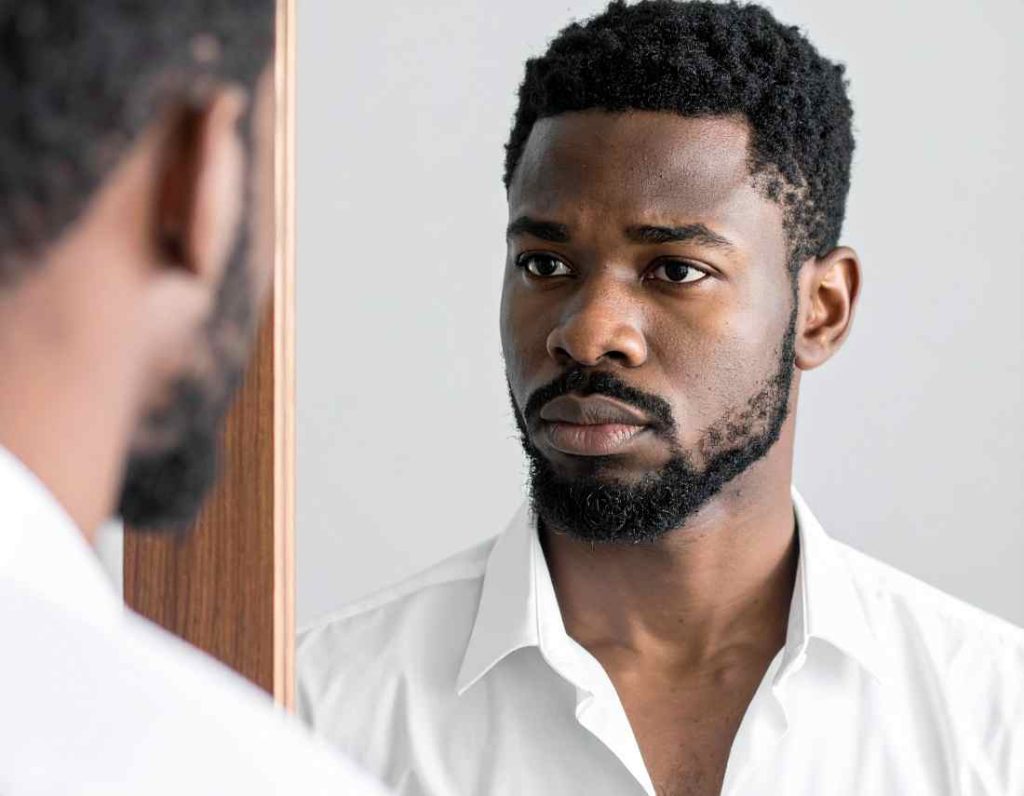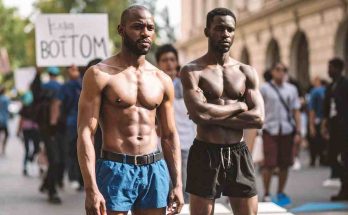By Daniel Nkado.

For many young gay men today, accepting themselves or even coming out is only the beginning. Beyond family and societal acceptance, there’s another world to navigate: the gay community itself.
Almost every gay man faces this complex, often silent struggle — the pressure to maintain a certain image within the community. And within the fantasy world of gay men, maintaining a “good reputation” can sometimes feel like a full-time job.
From social media expectations to respectability politics, this article explores what it really means to keep a “good reputation” in a world that promises freedom but often delivers judgment in other forms.
The Pressure to Fit In
Once inside the community, it’s easy to notice how people are often placed into specific boxes — top, bottom, vers, masc, fem, and so on. These labels are seen on every corner of gay dating and hookup apps like Grindr and Jack’d, shaping how people connect.
While labels can help foster connection, they also create unspoken rules about how one should act, dress, or even speak. Young gay men who don’t fit neatly into any category often feel left out or invisible.
In many spaces—both online and offline—being seen as “masculine,” “fit,” or “confident” earns more approval. This silent pressure to match the “ideal gay image” can push individuals to perform versions of themselves that aren’t fully authentic (Bonell et al., 2023)1.
The Stress of Excessive Shape-Shifting
Many gay men learn to code-switch early in life—consciously altering pitch, mannerisms, or appearance to avoid discrimination, stereotypes, or discomfort. Examples include straight-passing behaviour at work, or posting gym-bro selfies on Instagram.
This constant shape-shifting takes real psychological energy. Studies on minority stress and self-presentation describe it as high-effort coping that leads to identity fatigue, anxiety, and a fragmented sense of self (Michaels et al., 2015)6.
In plain language: the more you hide or adjust who you are, the harder it becomes to remember your true self.

The Fear of Being Judged by Your Own
Judgment can exist even within a group meant to be accepting. In the gay community, reputation is often perceived to shape how others treat you — whether you’re considered “dateable,” “popular,” or “problematic.”
Reputation in gay social spaces often creates a toxic hierarchy, shifting from helpful shared norms to a performance-based ranking system fueled by social media likes, gossip, and curated images, which sacrifices genuine connection.
The key difference young gay men need to learn is this:
- Social currency is what strangers and acquaintances say about you – the rumors and the reputation points.
- Your Community is the small group of people who actually know you and love the real you.
Chasing social currency leads to burnout and loneliness. Investing in real community offers lasting belonging and acceptance, built on character rather than image management.
Performance vs Authenticity
Gay social spaces tend to value “performance” over genuine expression.
Performance refers to the outward presentation of actions, choices, and behaviours that individuals display to others, often with an audience in mind.
Three reasons gay people perform:
- To manage reputation.
- Conform to expectations.
- Achieve a desired goal, e.g., a gay man may exaggerate masculine qualities to appear macho when in a setting where hyper-masculinity is valued.
Performed behaviours usually highlight common visible ideals in gay culture—e.g., hypermasculinity (dom, macho, straight-passing) or signals of a high-status lifestyle. This ensures that the behaviour attracts more attention, which translates to approval/validation (currency).

While it can be a strategic tool for navigating social spaces, performance also carries psychological costs when individuals feel compelled to constantly adjust their behaviour to fit external norms or ideals. This continuous self-monitoring demands emotional and cognitive energy, often leading to stress, anxiety, or a diminished sense of authenticity.
Additionally, the focus on superficial qualities such as appearance, status signals, or curated personas often overshadows deeper qualities like kindness, honesty, or emotional intelligence, which matter more for real connection and well-being (Soulliard et al., 2023)8.
The Respectability Trap
Respectability politics is a harmful manifestation of internalised homophobia in which gay men police each other’s behaviour—avoiding anything seen as “too gay,” like femininity or sexual openness—in an effort to feel safer and more accepted by the heterosexual world.
This pressure often pushes people to create a “false self,” a sanitised, heteronormative performance designed to ward off shame rather than express who they truly are. In the end, this mindset traps the gay community in the same cycle of judgment it hoped to escape, replacing freedom with new, restrictive expectations that isolate and alienate anyone who doesn’t or can’t fit the mould.
Social Media and the Visibility Paradox
Social media can be an essential tool in the life of some gay men by providing visibility, affirmation, and community that may be absent in their offline lives. However, this connection comes with real psychological costs. Research highlights a “visibility paradox” describing both a benefit and a harm.
Online platforms like Instagram and Twitter (X) play a role in making authentic self-expression more accessible for many gay men, but at the same time, heavy engagement is also linked to higher levels of depression driven by hyper-comparison, online scrutiny, and exposure to cyberbullying (Escobar‑Viera et al., 2018)4.
The Hidden Cost of Keeping Up Appearances
The struggle to maintain a polished reputation comes at a price. Constantly worrying about how others see you can lead to burnout, loneliness, or identity loss. Many young gay men edit their personalities to please friends, followers, or potential partners, blurring the line between performance and authenticity (Goffman, 1959)5.
Managing Reputation Never Works 100%.
Impression management — the effort to influence how others perceive you — is often driven by low self-esteem and can quickly become a source of anxiety or paranoia (Moagi et al., 2021)7.
Many young gay men feel pressured to manage how others see them, but this kind of constant self-curating is both draining and often ultimately impossible. No matter how carefully you present yourself, people will interpret your actions through the lens of their own biases and experiences.
Trying to control those perceptions often backfires, fueling anxiety, lowering self-esteem, and in some cases even leading to paranoia.
A healthier approach is to ground yourself in evidence rather than assumptions. Instead of imagining what others might be thinking, remind yourself that most people are far too preoccupied with their own lives to scrutinise yours, at least not as closely as you fear.
Shifting focus from external approval to internal stability not only protects mental health but also opens the door to more authentic and meaningful connections.
How Reputation Pressure Affects Sex Among Young Gay Men
Reputation extends into the sexual lives of gay men as well. Sexual roles like top, bottom, or vers carry quiet hierarchies. Being seen as “masculine” often earns more respect, while being “too soft” or “too eager” can invite subtle judgment.
As a result, sex can become more about validation than intimacy — a performance to prove desirability or confidence rather than a genuine connection. This performance anxiety undermines intimacy and leaves many gay men feeling disconnected from themselves.
At its core, sex should be about vulnerability and connection. But when reputation takes centre stage, intimacy is lost, replaced by anxiety and disconnection.
Choosing Authenticity Over Image
There is a growing appreciation for authenticity over self‑branding and performance, particularly among younger generations of gay men. Instead of chasing curated images or rehearsed personas, many young gay men are beginning to value honesty, vulnerability, and emotional intelligence as markers of connection (Ciszek & Lim, 2021)2.
This shift reflects a broader cultural movement away from reputation as currency and toward community as belonging — where being “real” matters more than being “perfect.”

Choosing Authenticity Over Perfection — Practical Steps That Help
- Invest in finding a small circle of community or chosen family that celebrates the real you (not tolerates you).
- Take regular breaks from dating and social apps when they start to feel like report cards.
- Accept that someone else’s preference is not a reflection of your value.
- Be honest about who you are. Reflect on what truly matters to you, making choices that reflect your genuine beliefs, values, and desires, rather than conforming to external expectations.
- During a moment of reputation-related anxiety, ask yourself for evidence. Most people are far too preoccupied with themselves to be studying you.
Final Thoughts
Constantly editing yourself to fit expectations drains emotional energy and often leads to burnout, anxiety, or self-doubt. Moreover, people filter everything you do through their own biases, experiences, and insecurities. That means that even the most carefully curated image will be interpreted differently by others, depending on who’s looking.
Reputation is also fragile and can change overnight — a single rumour, misstep, or unpopular opinion can undo months of “reputation management”. This shows how unstable reputation really is as a currency.
Authenticity, by contrast, offers a sustainable path: it builds character, fosters resilience, and creates genuine connections that endure beyond appearances.
References
- Bonell, S., Wilson, M. J., Griffiths, S., Rice, S. M., & Seidler, Z. E. (2023). Why do queer men experience negative body image? A narrative review and testable stigma model. Body Image, 45, 94–104. https://doi.org/10.1016/j.bodyim.2023.02.005
- Ciszek, E., & Lim, H. S. (2021). Perceived Brand Authenticity and LGBTQ Publics: How LGBTQ Practitioners Understand Authenticity. International Journal of Strategic Communication, 15(5), 395–409. https://doi.org/10.1080/1553118x.2021.1988954
- Downs, A. (2012). The Velvet Rage: Overcoming the Pain of Growing Up Gay in a Straight Man’s World (Updated second ed.). Boston, MA: Da Capo Lifelong, 2012. (Original work published 2005). https://catalog.freelibrary.org/Record/1845723
- Escobar-Viera, C. G., Whitfield, D. L., Wessel, C. B., Shensa, A., Sidani, J. E., Brown, A. L., Chandler, C. J., Hoffman, B. L., Marshal, M. P., & Primack, B. A. (2018). For Better or for Worse? A Systematic Review of the Evidence on Social Media Use and Depression among Lesbian, Gay, and Bisexual Minorities. JMIR Mental Health, 5(3), e10496. https://doi.org/10.2196/10496
- Goffman, E. (1959). The Presentation of Self in Everyday Life. Anchor Books.
- Michaels, M. S., Parent, M. C., & Torrey, C. L. (2015). A Minority Stress Model for Suicidal Ideation in Gay Men. Suicide and Life-Threatening Behaviour, 46(1), 23–34. https://doi.org/10.1111/sltb.12169
- Moagi, M. M., Der Wath, A. E. van, Jiyane, P. M., & Rikhotso, R. S. (2021). Mental health challenges of lesbian, gay, bisexual and transgender people: An integrated literature review. Health SA Gesondheid, 26(1487). https://doi.org/10.4102/hsag.v26i0.1487
- Soulliard, Z. A., Lattanner, M. R., & Pachankis, J. E. (2023). Pressure From Within: Gay-Community Stress and Body Dissatisfaction Among Sexual-Minority Men. Clinical Psychological Science. https://doi.org/10.1177/21677026231186789



Few months ago i got a little problem with my lover which make me and him to break up